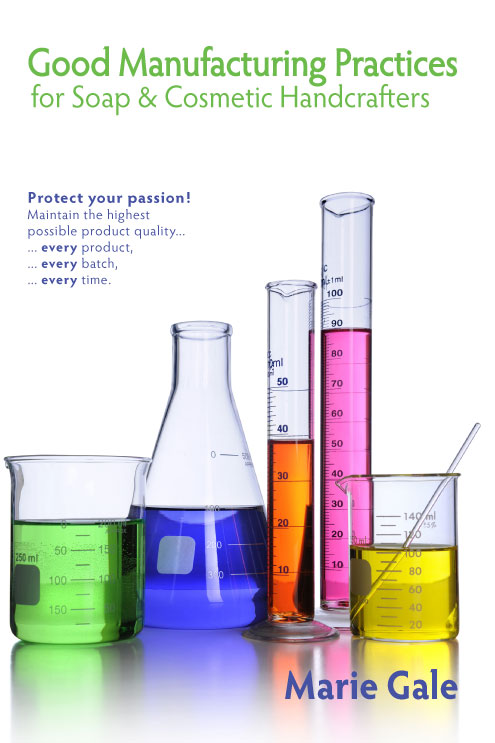Connecticut is one of the states that has permit, license, and inspection requirements for businesses that make cosmetics (officially called “cosmetic manufacturers”). While these laws and regulations have been on the books since at least 2009 (probably earlier), according to one person making handcrafted cosmetics they have only started to be enforced on small and handcrafted businesses within the last few years.
Permits and licensure are handled under the Connecticut Department of Consumer Protection, Drug Control Division. The Manufacturer of Drugs, Medical Devices and/or Cosmetics page has some additional information (not much) and a link to the application form. The application fee is $285 fee for manufacturers with 5 or fewer chemists; an inspection is required. The license must be renewed every year, with a new inspection and application fee.
There isn’t any information on the website about what the inspection entails, and I couldn’t find anything in the regulations or statutes. Since it is the same application form for drug, medical device, and cosmetic manufacturers, and it is unlikely that cosmetic manufacturers will be held to the same standards as drug manufacturers and compounders, I contacted them for clarification.
In response, they provided me a document named “Cosmetic Information” which looks like the text they send prior to an inspection and a copy of the inspection checklist.
This is the complete content of that one-page document. “I”and “me” appears to refer to the inspector.
From the Inspector:
Please provide me several dates and times that are available for the inspection. I will be looking to:
- Personnel are appropriately trained and are capable of performing and qualified to perform their assigned duties. Such training should be documented.
- Compounding ingredients of the appropriate identity, purity, and quality are purchased from reliable sources and are properly stored according to manufacturer specifications or USP standards.
- Bulk component containers are labeled with appropriate Occupational Safety and Health Administration (OSHA) hazard communication labels (see OSHA. gov), and Material Safety Data Sheets (MSDSs) are available to compounding personnel for all chemicals used in compounding.
- All equipment used in compounding is clean, properly maintained, and used appropriately.
- The compounding environment is suitable for its intended purpose; and procedures are implemented to prevent cross contamination.
- Only authorized personnel are allowed in the immediate vicinity of the compounding operations.
- There is assurance that processes are always carried out as intended or specified and are reproducible.
- Compounding conditions and procedures are adequate for preventing errors.
- All aspects of compounding are appropriately documented.
- A Master Formulation Record should be created before compounding a preparation for the first time. This record shall be followed each time that preparation is made. In addition, a Compounding Record should be completed each time a preparation is compounded.
- Compounding is done in an appropriately clean and sanitized area dedicated to this activity.
- Only one preparation is compounded at one time in a specific workspace.
- Appropriate compounding equipment has been selected and inspected for cleanliness and correct functioning and is properly used.
- Documentation, written or electronic, enables a compounder, whenever necessary, to systematically trace, evaluate, and replicate the steps included throughout the preparation process of a compounded preparation. These records should be retained for the same period of time that is required under state law.
- The safety, quality, and performance of compounded preparations depend on correct ingredients and calculations, accurate and precise measurements, appropriate formulation conditions and procedures, and prudent judgment. As a final check, the compounder shall review each procedure in the compounding process. To ensure accuracy and completeness, the compounder shall observe the finished preparation to ensure that it appears as expected and shall investigate any discrepancies.
- Finally there should be some method of tracking products that are sold to consumers and that may need to be returned to you due to manufacturing malfunctions.
These issues should be addressed in policy and procedures and should be available for review.
Email to Marie Gale from Gina Abdelghany, PharmD., State of Connecticut Drug Control Division, Department of Consumer Protection, Manufacturers of Drugs, Medical Devices and/or Cosmetics. August 21, 2018.
Good Manufacturing Practices
These guidelines appear to be based on basic Good Manufacturing Practices. If you are unfamiliar with general GMP guidelines, my book Good Manufacturing Practices for Soap and Cosmetic Handcrafters covers most of the points above. There are also a number of helpful posts under the category of Good Manufacturing Practices on this blog.
Practical Experience
I spoke (by email) with a member of the Handcrafted Soap and Cosmetic Guild who has been through the annual permitting process in Connecticut. She had contacted the Department of Consumer Protection about 6 1/2 years ago when she started her business and was told that the permits weren’t required for businesses as small as hers, but that changed last year when they started to crack down on “anyone and everyone” making and selling products.
Her experience with the inspection was that it was pretty detailed, concentrating on GMP to ensure that the products manufactured would be safe and clean. She said that there was heavy emphasis on recall procedures, and a specific quarantine bin/cabinet (labeled as such and used for nothing else). They looked at her scales, checked her recipes, looked at batch records, and checked ingredient labeling and storage. In her case there were a few things that didn’t pass, but she was able to put them into place immediately and passed the inspection when they returned a few days later.
This handcrafter worked in a manufacturing studio in a commercial building. She reported that she knew of two cosmetic makers who work from home who were able to pass inspection, so there doesn’t appear to be a restriction against home-based manufacturing. However, she also said that each has a dedicated space that is not accessbile to outside guests, pets, or family members, and that the facilities (sink, fridge, etc.) can’t be used for anything other than production (so not working out of your kitchen).
In the Real World
What does it mean in the real world? Apparently, the State of Connecticut is getting creative on their enforcement. According to my sources, it’s becoming much more common for local stores to ask about licenses before buying and for managers of farmers’ markets to require proof of licensure for anyone vending cosmetics.
If you are in Connecticut and manufacturing cosmetics at any level, keep in mind that you are operating your business at risk if you haven’t gotten your permit and inspection and been approved.



Leave a Reply